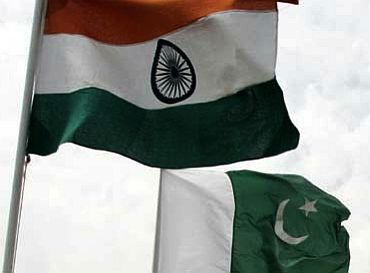 Delegates of a bilateral peace delegation urge the prime ministers of Pakistan and India to resume dialogue for peace and full normalisation of relations
Delegates of a bilateral peace delegation urge the prime ministers of Pakistan and India to resume dialogue for peace and full normalisation of relations
On the invitation of the Regional Peace Institute, and with the support of the Hanns Seidel Foundation, a 13-member delegation led by former petroleum minister Mani Shankar Aiyar, visited Pakistan to attend the first Pakistan-India bilateral dialogue in Islamabad on June 14. Other members of the delegation included Salman Khurshid, former external affairs minister of India, Ambassador N N Jha, Dileep Padgaonkar, Siddharth Varadarajan, Sanjeev Ahluwalia, Anil Padmanabhan, Dr Ved Pratap Vaidik, Sudheendra Kulkarni, Dr Zoya Hasan, Barkha Dutt, Amit Baruah and Aakar Patel.
Led by the former foreign minister and RPI chairperson Khurshid Mahmud Kasuri, the Pakistani delegation comprised General (retd) Ehsan ul Haq, co-chairperson, RPI; Raoof Hasan, executive director; Dr Hafiz Pasha; Shahnaz Wazirali; Riaz H Khokhar; Bushra Gohar; Farhat Ali; Aziz Ahmad Khan; Shahid Malik; Lt Gen (retd) Asad Durrani; M Ziauddin Ahmad; Arif Nizami; and Dr Moeed Pirzada.
There were four sessions held during the conference dealing with the following subjects:
- Pakistan-India Dialogue Process: The Key to Peace
- Strengthening Economic Stakes: A Sustainable Platform for Peace
- Expanding Social Linkages: Consolidating the Prospects of Peace
- The Media and the Message
The delegates discussed all issues troubling the relationship between the two neighbours in a frank, cordial and constructive manner. A strong desire was expressed from both sides to free themselves from the bitter legacy of tension and acrimony. The desirability of peace with justice and equity for both sides was accepted by all delegates and it was resolved that this message should be carried across to a larger cross-section of people on both sides of the border.
The participants appreciate the positive tone and content of the meeting, followed by an exchange of letters, between Prime Minister Nawaz Sharif and Prime Minister Narendra Modi. The proposed meeting of the foreign secretaries, it is hoped, will lead to a resumption of the bilateral dialogue that has remained suspended for over five years now. This could bring about an extremely meaningful change in the atmosphere in our two countries as well as the entire region.
The participants agree that all the issues that have, in the past, formed part of the composite dialogue including contentious ones like Kashmir and the incidents of terrorist violence should be discussed by the two governments. In doing so, progress made in, and consensus arrived at, in previous parleys, should become the basis for achieving rapid progress with concrete results in a reasonably short time.
The participants strongly condemn all acts of terrorist and other forms of violence irrespective of who the perpetrators or victims of such violence are. They urge the governments of the two countries to take all necessary steps to combat forces of religious extremism and to promote our common heritage of religious freedom, tolerance, plurality, peace and brotherhood.
The delegates feel that enhanced connectivity in the economic and social sectors can greatly contribute in furthering the prospects of peace. The key role that the media need to play in carrying forth this message of peace to the people of the two countries was also highlighted. Media should project a positive image of Pakistan in India and of India in Pakistan at the grassroots level to broaden the constituency of peace in both countries.
There is an urgent need for the two governments to take all such measures as are necessary to expand and deepen social bonds between the people of the two countries. In particular, divided families on both sides of the border should be enabled to reunite by easing the visa procedures. Issuance of visa should also be made simpler, indeed automatic for many categories, to enable a wide range of professionals as well as tourists to travel from one country to the other.
There are two fights that both Pakistan and India need to fight: the fight within and the fight without. The fight within relates to addressing the fear factor and the fight without is to engage with each other in an irreversible and interrupted dialogue that encompasses all areas of contention.
It is also recommended that, in order to further strengthen the linkages in various fields, India should open a consulate in Karachi and Pakistan should do likewise in Mumbai. As promised by the Indian government in the late seventies, Jinnah House in Mumbai should be handed over to Pakistan to open its consular office there.
There is general consensus that the present time is most propitious for the two governments to engage with each other because the two recently-elected leaderships have the credibility and capacity to take challenging decisions. The need is for the two leaderships to transcend the bitter legacy of the past and enter the domain of hope for the underprivileged and impoverished people of the region. The positive vibes that such reconciliation will send to the entire South-Asian region are immense which would usher in an unprecedented era of multidimensional progress and prosperity.






 © 2025
© 2025